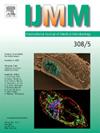男男性行为者和变性女性的症状性生殖器支原体感染:我们应该跳过大环内酯类药物吗?
IF 3.6
3区 医学
Q1 MICROBIOLOGY
引用次数: 0
摘要
生殖支原体是一种新兴的性传播感染(STI),其抗菌素耐药性日益增强,特别是在男男性行为者(MSM)中。本研究旨在评估在西班牙巴塞罗那一家专门的性传播感染诊所就诊的有症状的MSM和变性妇女(TGW)中生殖器支原体的发病率、临床特征和抗生素耐药性模式。方法于2024年1 - 12月进行回顾性观察研究。纳入经核酸扩增试验(NAAT)诊断为生殖器支原体的有症状的MSM和TGW患者。实时荧光定量PCR检测大环内酯类和氟喹诺酮类耐药突变。患者根据欧洲指南进行耐药引导治疗。结果71例生殖道支原体感染患者中,53.5% %表现为尿道炎,42.3% %表现为直肠炎。35. %合并性传播感染,29.5 %有近期性传播感染史。令人担忧的是,85.9 %的患者携带阿奇霉素耐药相关突变,而42.3 %的患者对阿奇霉素和莫西沙星双重耐药。26例患者(36.6% %)进行了治愈试验(TOC),其中23.1% %(6/26)为阳性,主要原因是双耐药。其余45例患者没有随访,但在6个月内没有复发记录。结论MSM中大环内酯耐药生殖支原体的高发率强调了一线治疗策略的必要性,特别是在耐药检测有限的环境中。需要进一步的研究来优化治疗方案,并评估高风险人群常规大环内酯药敏试验的成本效益。本文章由计算机程序翻译,如有差异,请以英文原文为准。
Symptomatic Mycoplasma genitalium infections in men who have sex with men and trans women: Should we skip macrolides?
Background
Mycoplasma genitalium is an emerging sexually transmitted infection (STI) with increasing antimicrobial resistance, particularly among men who have sex with men (MSM). This study aimed to evaluate the incidence, clinical characteristics, and antibiotic resistance patterns of M. genitalium among symptomatic MSM and transgender women (TGW) attending a specialized STI clinic in Barcelona, Spain.
Methods
A retrospective observational study was conducted between January and December 2024. Symptomatic MSM and TGW patients diagnosed with M. genitalium through nucleic acid amplification testing (NAAT) were included. Macrolide and fluoroquinolone resistance mutations were detected using real-time PCR assays. Patients were treated according to European guidelines, with resistance-guided therapy.
Results
Among 71 patients with M. genitalium infection, 53.5 % presented with urethritis and 42.3 % with proctitis. Coinfection with other STIs was detected in 35 %, and 29.5 % had a history of recent STI. Alarmingly, 85.9 % of patients carried azithromycin resistance-associated mutations, while 42.3 % showed dual resistance to azithromycin and moxifloxacin. A test of cure (TOC) was performed in 26 patients (36.6 %), with 23.1 % (6/26) of them remaining positive, mainly due to dual resistance. The remaining 45 patients were lost to follow-up, but no relapses were recorded in six months
Conclusions
The high prevalence of macrolide-resistant M. genitalium among MSM underscores the need for alternative first-line therapeutic strategies, particularly in settings with limited access to resistance testing. Further research is required to optimize treatment regimens and evaluate the cost-effectiveness of routine macrolide susceptibility testing in high-risk populations.
求助全文
通过发布文献求助,成功后即可免费获取论文全文。
去求助
来源期刊
CiteScore
9.70
自引率
0.00%
发文量
18
审稿时长
45 days
期刊介绍:
Pathogen genome sequencing projects have provided a wealth of data that need to be set in context to pathogenicity and the outcome of infections. In addition, the interplay between a pathogen and its host cell has become increasingly important to understand and interfere with diseases caused by microbial pathogens. IJMM meets these needs by focussing on genome and proteome analyses, studies dealing with the molecular mechanisms of pathogenicity and the evolution of pathogenic agents, the interactions between pathogens and host cells ("cellular microbiology"), and molecular epidemiology. To help the reader keeping up with the rapidly evolving new findings in the field of medical microbiology, IJMM publishes original articles, case studies and topical, state-of-the-art mini-reviews in a well balanced fashion. All articles are strictly peer-reviewed. Important topics are reinforced by 2 special issues per year dedicated to a particular theme. Finally, at irregular intervals, current opinions on recent or future developments in medical microbiology are presented in an editorial section.

 求助内容:
求助内容: 应助结果提醒方式:
应助结果提醒方式:


